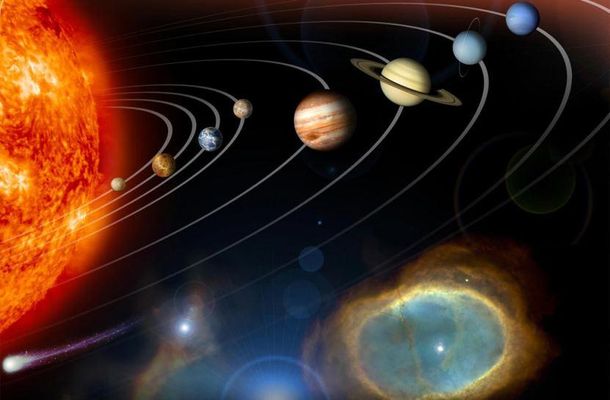
How did we get the Universe? I was once thinking of how we got the universe in a lesson at school,i know its something to do with the big bang but before that we have nothing,but what is nothing?
Answers (18)
vote up or down the answers
Answer Link


Most astronomers think that the universe was formed during an event called the Big Bang - a giant explosion which occured between 10 and 20 billion years ago. During the Big Bang all of the space, time, matter and energy in the universe was created. This giant explosion hurled matter in all directions and caused space itself to expand. As the universe cooled the material in it combined to form galaxies, stars, and planets.
on June 05, 2012
Answer Link


You Have Been Selected
Charles Darwin (1809-1882) published his On the Origin of Species in 1859 and set forth his theory that animals evolved through variation and natural selection to those most fit to survive in particular environments. Here's a brief summary of some of its main ideas.
•Biological organisms and species do not have a fixed, static existence but exist in permanent states of flux and change.
•All life, from a biological point of view, takes the form of a struggle See More to exist, and to exist to produce the greatest number of offspring
•This struggle for existence removes those organisms less well adapted to any particular ecological system and allows those better adapted to flourish. This is the process called natural selection.
•Natural selection, development, and evolution require enormously long periods of time—so long that the everyday experience of human beings provides them with no ability to interpret these histories.
•The genetic variations that produce increased survivability are random a
Charles Darwin (1809-1882) published his On the Origin of Species in 1859 and set forth his theory that animals evolved through variation and natural selection to those most fit to survive in particular environments. Here's a brief summary of some of its main ideas.
•Biological organisms and species do not have a fixed, static existence but exist in permanent states of flux and change.
•All life, from a biological point of view, takes the form of a struggle See More to exist, and to exist to produce the greatest number of offspring
•This struggle for existence removes those organisms less well adapted to any particular ecological system and allows those better adapted to flourish. This is the process called natural selection.
•Natural selection, development, and evolution require enormously long periods of time—so long that the everyday experience of human beings provides them with no ability to interpret these histories.
•The genetic variations that produce increased survivability are random a
on July 11, 2013
Answer Link


Theories of the Universe
How Did We Get Here?
Theories of the Universe
•Evolution vs. Creationism
•It's a Matter of Opinion
•How Did We Get Here?
•And God Said … See More
I wanted to spend some time discussing ideas about the nature of truth because so much of what we believe about the world, the universe, cosmology, and God is based on what we consider to be true. At the end of the nineteenth century, many scientists believed that all that could be known about cosmology was indeed known, and any anomalies would soon be resolved. Little did they know what Einstein and the rest of twentieth-century physics had in store for them.
What was to happen to nineteenth-century Newtonian cosmology had already occurred to some degree with the accepted story of creation. While science continued in the twentieth century to expand upon its theories, religious dogmatism fought any change to its interpretation of the truth. What was it that threatened the long-held belief of creation?
Black Holes
A common misconception in evo
How Did We Get Here?
Theories of the Universe
•Evolution vs. Creationism
•It's a Matter of Opinion
•How Did We Get Here?
•And God Said … See More
I wanted to spend some time discussing ideas about the nature of truth because so much of what we believe about the world, the universe, cosmology, and God is based on what we consider to be true. At the end of the nineteenth century, many scientists believed that all that could be known about cosmology was indeed known, and any anomalies would soon be resolved. Little did they know what Einstein and the rest of twentieth-century physics had in store for them.
What was to happen to nineteenth-century Newtonian cosmology had already occurred to some degree with the accepted story of creation. While science continued in the twentieth century to expand upon its theories, religious dogmatism fought any change to its interpretation of the truth. What was it that threatened the long-held belief of creation?
Black Holes
A common misconception in evo
on July 11, 2013
Answer Link
on February 13, 2016
Answer Link


Who's disliking all these comments? I don't actually know, I believe in the Scientific theory, the Big Bang.
on February 02, 2014
Answer Link


http://www.infoplease.com/cig/theories-universe/how-did-we-get-here.html Also read whole thing here.
on July 11, 2013
Answer Link


The main conclusion here arrived at, and now held by many naturalists who are well competent to form a sound judgment, is that man is descended from some less highly organized form. The grounds upon which this conclusion rests will never be shaken, for the close similarity between man and the lower animals in embryonic development, as well as in innumerable points of structure and constitution, both high and of trifling importance, the rudiments which he retains, and the abnormal See More revisions to which he is occasionally liable, are facts which cannot be disputed. They have long been known, but until recently they told us nothing with respect to the origin of man. Now when viewed in the light of the whole organic world their meaning is unmistakable. The great principle of evolution stands up clear and firm, when these groups of facts are considered in connection with others, such as mutual affinities of the members of the same group, their geographical distribution in past and present times, and their geological
on July 11, 2013
Answer Link


The Ladder of Creation
Cosmonotes
While Darwin's theory is far from being complete, and some scientists would be the first to admit that, it does stimulate thinking and breeds new theories. That is its strength. Its weakness, besides being incomplete, is that it, like most of science, supplies no purposeful action for the underlying phenomena it seeks to explain. Isn't that as important of a question to ask as the questioning of religious dogma?
The effect of these points See More was to do the same thing that the Copernican revolution did, and that was to move humanity away from the center of creation and imply that it could hardly be its crowning glory. Natural selection, which apparently leaves no place for God in the world, has proved the most difficult part of the theory for some to accept. What other Biblical traditions does it question? Well here's a few that pop out:
•By emphasizing that species changed, evolutionary theories apparently destroyed ancient notions of the Great Chain of Being, in which all li
Cosmonotes
While Darwin's theory is far from being complete, and some scientists would be the first to admit that, it does stimulate thinking and breeds new theories. That is its strength. Its weakness, besides being incomplete, is that it, like most of science, supplies no purposeful action for the underlying phenomena it seeks to explain. Isn't that as important of a question to ask as the questioning of religious dogma?
The effect of these points See More was to do the same thing that the Copernican revolution did, and that was to move humanity away from the center of creation and imply that it could hardly be its crowning glory. Natural selection, which apparently leaves no place for God in the world, has proved the most difficult part of the theory for some to accept. What other Biblical traditions does it question? Well here's a few that pop out:
•By emphasizing that species changed, evolutionary theories apparently destroyed ancient notions of the Great Chain of Being, in which all li
on July 11, 2013
Answer Link


well... there WAS something before the big bang... Scientists have now found out that our sun is a Sixth Generation Sun because supposedly OUR sun has blown up six times now
on August 24, 2012
Answer Link


i suppose but it still does'nt answer my question about the something there before thats what i was trying to find out.
on July 08, 2012
Answer Link


there was something there before but then the sun blew up and created the big band... does that help...
on July 05, 2012





